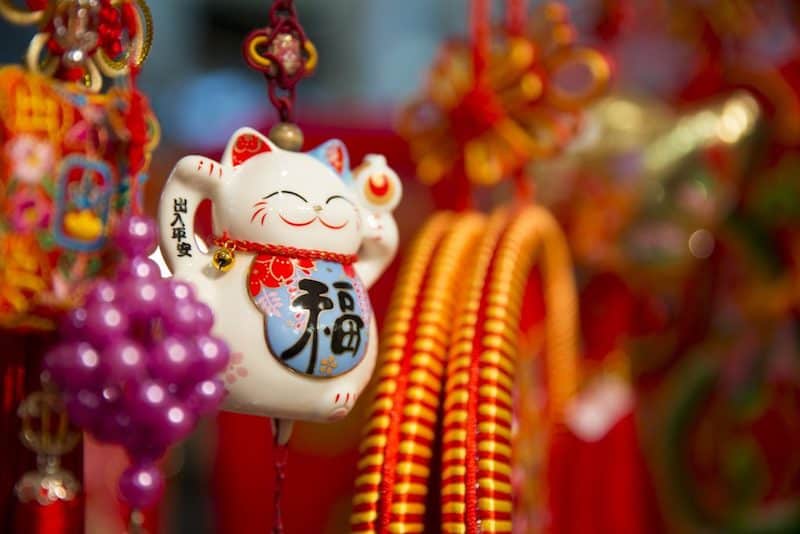The History of Chinese Lucky Charms
Discover the intriguing history and cultural importance of Chinese fortunate charms. Chinese fortunate charms have a long and illustrious history dating back thousands of years. They are firmly ingrained in Chinese culture and have played an important part in the lives of many people seeking fortune and protection. These charms come in a variety of shapes and sizes, including jade pendants, red envelopes, and zodiac animal figurines, each representing a different set of blessings and wishes. If you're a fan of arabian casinos, the rich tradition of Chinese fortunate charms reflects a fascinating cultural aspect that transcends geographical boundaries.
The red envelope, known as 'hongbao,' is one of the most popular Chinese fortunate charms. The color red is thought to fend off evil spirits while also bringing happiness and good fortune.
The jade pendant is another popular lucky charm. The complex carvings on jade pendants frequently reflect auspicious symbols such as dragons, phoenixes, and lotus flowers, which represent power, beauty, and purity.
Lucky charms made of Chinese zodiac animals are very popular. Each year is connected with a different animal sign, and people frequently wear or exhibit figurines of their astrological animal for protection and good luck.
Ancient Symbols of Good Luck
The auspicious red knot is an old emblem of good luck in Chinese culture. This sign, often known as the Chinese lucky knot or the endless knot, symbolizes life's never-ending cycle and the interconnectedness of all things. It is said to bring those who hold it good fortune, happiness, and wealth. The knot's crimson color is considered fortunate and represents luck and joy. Whether you're exploring the world of casino in Dubai or other cultural contexts, the red knot's symbolism adds an extra layer of significance to the concept of good luck and prosperity.
The red knot is frequently used to provide blessings and good luck to participants in Chinese traditional rituals such as weddings and New Year celebrations. Red knots are also hung in homes or worn as jewelry to attract positive energy and fight off evil spirits. The knot's elaborate pattern, with its interconnecting loops, represents unity, harmony, and the eternal link between loved ones.
The red knot is a significant symbol of kinship and connection in Chinese culture. It represents the bonds that unite individuals and communities, fostering a sense of oneness and collective identity.
The Significance of Red in Chinese Culture
Red has a unique place in the Chinese people's hearts, representing good fortune, happiness, and wealth. It is thought to fend off evil spirits and provide good fortune. Whether you're exploring the world of online Casinos, specific platforms like Betfinal or any other context, the significance of the color red in Chinese culture adds an extra layer of meaning to the pursuit of positive outcomes and prosperity.
During festivals and festivities, red lanterns light the streets, conveying joy and generating a sense of belonging. During the Lunar New Year and other important events, red envelopes, known as 'hongbao,' containing money, are given as a gesture of good luck and blessings.
The bride wears a crimson wedding gown in traditional Chinese weddings to symbolize happiness and fertility. Red is also important in Feng Shui, the ancient Chinese art of harmonizing one's surroundings to produce positive energy. The Chinese believe that by introducing red motifs into their homes and businesses, they can attract good luck and success.
The Role of Chinese Zodiac Animals
Each person is assigned an animal sign depending on their birth year in Chinese astrology. These animals reflect many traits and qualities that define your personality and fate. In the wide world of online online casinos UAE, the Chinese zodiac provides an interesting lens through which individuals view their characteristics and destinies.
There are twelve animal signs in the Chinese Zodiac: rat, ox, tiger, rabbit, dragon, snake, horse, sheep, monkey, rooster, dog, and pig. Each animal sign is associated with specific characteristics and features. Those born in the Year of the Rat, for example, are seen to be bright and resourceful, whilst those born in the Year of the Dragon are considered to be confident and ambitious.
The Chinese Zodiac animals are also cyclical, with a 12-year cycle. The Chinese Zodiac cycle is thought to have a tremendous impact on your life events, compatibility with others, and even your fortunes.
By embracing your animal sign's influence, you may make better informed judgments, cultivate positive attributes, and confidently handle life's problems.
The Power of Jade in Chinese Beliefs
- Symbol of purity: The vibrant green color of jade symbolizes purity and perfection. It’s believed that wearing or owning jade can cleanse your mind, body, and soul, creating a sense of inner harmony.
- Bringer of luck: Jade is considered a powerful talisman that attracts good luck and fortune. It’s believed to bring prosperity and abundance into your life, making you feel secure and supported in your endeavors.
- Guardian of health: In Chinese culture, jade is associated with healing and protecting the physical body. It’s believed to have the ability to ward off negative energies and promote good health.
The Influence of Feng Shui on Lucky Charms
Feng Shui, an ancient Chinese discipline, is all about balancing and good energy in your surroundings. The arrangement of objects in your area is thought to affect the flow of energy, or 'qi,' and so affect several elements of your life, including luck, success, and even aspects related to casino bonuses if you incorporate this practice into your gaming environment.
In Feng Shui, lucky charms are frequently employed to increase the positive energy in your environment. Certain objects are thought to bring good luck and fortune according to Feng Shui concepts. These lucky charms are deliberately placed throughout your house or office to generate positive energy.
The use of a wealth ship or a money frog, for example, is said to bring financial abundance. A laughing Buddha, on the other hand, is supposed to bring you joy and happiness. These lucky charms serve as reminders of your objectives and goals, assisting you to focus your energy and attract great outcomes.
In Feng Shui, the placement of these artifacts is just as important as the individual lucky charms. Each facet of your life is represented by a separate section of your space, such as prosperity, love, or health. You can increase the positive energy flow and welcome good fortune into your life by placing the appropriate fortunate charms in these spots.
The Lucky Number 8 in Chinese Culture
The number 8 is considered exceedingly lucky in Chinese culture and is associated with money, prosperity, and success. Here are three reasons why the number eight is so significant in Chinese culture:
- Symbol of Prosperity: The pronunciation of the number 8 in Chinese sounds similar to the word for ‘wealth’ or ‘fortune.’ Therefore, having the number 8 in your life is believed to attract abundance and prosperity.
- Favorable Characteristics: The number 8 is seen as a symbol of balance and harmony. Its symmetrical shape is pleasing to the eye and represents a perfect balance between the material and spiritual worlds. Embracing the number 8 can bring a sense of harmony and belonging to your life.
- Cultural Significance: The number 8 is deeply ingrained in Chinese culture and is often associated with important events. For example, the Beijing Olympics in 2008 began on the eighth day of the eighth month at eight seconds and eight minutes past 8 o’clock. This demonstrates the cultural significance and belief in the power of the number 8.
The Auspiciousness of the Dragon in Chinese Mythology
The dragon is considered lucky in Chinese mythology due to its relationship with power, strength, and good fortune. The dragon is an important emblem in Chinese culture, representing imperial authority and divine protection. Incorporating symbols like the dragon may add an extra layer of significance to your pursuit of luck and fortune in various aspects of life.
The dragon is frequently portrayed as a mythical creature with a serpentine body, sharp claws, and a powerful tail. It is said to have power over the elements such as water, fire, and wind. This link to natural forces adds to its auspiciousness, as it represents harmony and balance in the universe.
Furthermore, the dragon's image of power and strength is intimately associated with the concept of good fortune. Having the dragon's favor is thought to bring success, fortune, and happiness in Chinese culture. Its presence is frequently regarded as a favorable omen, heralding the coming of good fortune and benefits.
The dragon is also important in traditional celebrations such as Chinese New Year and dragon boat races.
How Chinese Knots Bring Luck
Chinese knotting has been passed down through the years as a symbol of unity, wealth, and protection. The following are three reasons why Chinese knots might provide good fortune and a sense of belonging:
- Symbolism: Each knot is carefully crafted with specific meanings, such as the double happiness knot representing love and marriage, or the mystic knot symbolizing endless happiness and good fortune.
- Feng Shui: Chinese knots are often used in feng shui practices to enhance the flow of energy in a space. Placing a Chinese knot in your home or workplace can help create a harmonious environment and attracting luck.
- Personal Connection: Owning a Chinese knot can create a personal connection to Chinese culture and traditions. It serves as a reminder of the rich heritage and values associated with the knot.
The Magic of the Lotus Flower Symbol
In Chinese culture, the lotus flower symbol has a peculiar enchantment, capturing with its beauty and signifying purity and enlightenment. The lotus is considered as a sacred flower in Chinese tradition, representing the journey to spiritual awakening. Whether you're exploring the wide space of casinos like Lucky Dreams, or delving into other aspects of life, the lotus's symbolism carries a profound meaning, signifying the desire for a higher state of being and the ability to rise above challenges with pristine beauty.
By embracing the lotus flower emblem, you connect with the energy of purity and enlightenment. It is a guiding light that leads you to inner tranquility and spiritual growth. By incorporating the lotus flower into your life, whether through art, jewelry, or meditation, you are inviting the lotus' fascinating spirit into your own path.
The Prosperity Brought by the Money Toad
With the mystical power of the Money Toad, you can attract prosperity and abundance into your life. This auspicious species, also known as the Three-Legged Frog or Chan Chu, has long been cherished in Chinese culture as a symbol of prosperity. When you're exploring online casinos like BetoBet, or enhancing your surroundings in any context, showcasing a Money Toad in your home or company is believed to attract good fortune and financial prosperity.
Accept the Money Toad's power and invite prosperity into your life. Display this lucky charm with intention and belief, and you will see opportunities for money and abundance appear in front of you.
The Mystique of the Yin Yang Symbol
The Yin Yang symbol represents the universe's dual forces, such as light and dark, hot and cold, and masculine and feminine. It represents duality and the interdependence of opposites.
Yin | Yang |
Dark | Light |
Passive | Active |
Earth | Heaven |
Feminine | Masculine |
Including the Yin Yang sign in your surroundings can serve as a constant reminder of the importance of maintaining balance in all parts of your life. The Yin Yang sign can serve as a guide, assisting you in navigating life's problems and achieving equilibrium.
The mysticism of the Yin Yang sign can create a sense of calm and wholeness whether you choose to wear a Yin Yang pendant, display the symbol in your house, or contemplate on its meaning.
The Symbolism of the Chinese Phoenix
The Chinese Phoenix, also known as Fenghuang, is a symbol of prosperity, peace, and rebirth in Chinese culture. This magnificent bird is thought to bring blessings and good fortune, making it a potent symbol for individuals seeking prosperity. The Chinese Phoenix represents an enduring emblem of positive energy and renewal at all online casinos such as 747 live.
- Prosperity: The Chinese Phoenix is often associated with wealth and abundance. Its presence is believed to invite financial stability and success in various aspects of life, creating a sense of security and prosperity.
- Harmony: The Chinese Phoenix embodies harmony and balance in relationships. It symbolizes the ideal union between Yin and Yang, representing the harmonious partnership between two individuals or the balance within oneself. Its symbolism encourages unity and cooperation.
- Rebirth: The Chinese Phoenix is associated with new beginnings and renewal. With its ability to rise from the ashes, it signifies the power of transformation and resilience. This symbolism inspires individuals to embrace change, overcome challenges, and start afresh, fostering a sense of hope.





